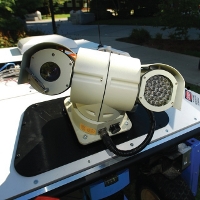About RICC
Steering Committee Members
Richard Beach, Western New England College
Gina Betti, WPI
Paul Brown, Hewlett Packard
Gregory Fischer, WPI
Michael Gennert, WPI
Li Han, Clark University
Fred Martin, UMASS Lowell
David Matheson, Onstott
William Michalson, WPI
Taskin Padir, WPI
Jason Rife, Tufts University
Chris Rogers, Tufts University
Colleen Shaver, WPI
Ken Stafford, WPI
Matthew Stein, Roger Williams University
Mikell Taylor, Heartland Robotics
Gretar Tryggvason, WPI
James Van de Ven, WPI
Jacob Warren, QinetiQ
Project Description
The goals of the RICC (supported by the National Science Foundation under Award No. CNS-0722218) are shown below, taken from the original summary document submitted for grant consideration.
CPATH-CB: Building Community via Robotics Innovations Competition and Conference This CPATH-CB proposal seeks support to build an intercollegiate and multi-disciplinary community of faculty promoting the education of entrepreneurially-oriented robotics engineering students through engagement in a Robotics Innovations Competition and Conference. The proposed task will involve several community building phases featuring workshops that will architect the competition, prepare the resource materials, provide a forum for participating university faculty and students and conclude with the first regional competition and conference.
The Robotics Innovations Competition and Conference will challenge students to design and build robots to perform useful and novel tasks through a university-level competition. Entrants will be judged primarily on the extent to which they meet existing needs or create new markets, and secondarily with respect to design and analysis, implementation skill, and business plans. While robotics competitions exist at the K-12 and university levels, these are notably based on games with a fixed set of rules. We believe that existing competitive games do not suffice; what is needed is a competition that emphasizes the engineering of solutions to open-ended real-world problems and that invites creativity by an open competition based on the intellectual and commercial and/or humane aspects of the solutions. Undergraduate and Graduate students from all CISE disciplines would participate in the competition as well as in the preparatory workshops and concluding conference.
Intellectual Merit: The intellectual merit of the proposed competition and conference is found in four immediate impacts: (1) stimulating students to imagine new robotics applications and encourage them to develop their ideas into working prototypes; (2) bringing student work to the attention of industry leaders who may see opportunities to further develop the students' ideas and providing a forum where the students can meet with industry representatives to learn about needs and new problems; (3) generating increased support for science and engineering nationwide by raising awareness of the role of computing in technical progress; (4) creating a new, action-oriented, forum for educators from many institutions to share their successful ideas for curricular and project content related to innovative robotics applications, thus speeding the growth of this new and important field in the context of a transformational change in CISE national educational practice.
Broader Impacts: One impact of the proposed work is the education of men and women to take the leadership in designing and developing new robotics applications for future industrial, military and household applications. In addition, dissemination of this program can have an impact on attracting K-12 students to critical SMET disciplines through increased exposure of robotics. Because of the power of robotics-oriented activities to break down traditional cultural barriers that prevent students from realizing their potentials as engineers and/or as business leaders due to gender and racial bias in upbringing, we expect the proliferation of this form of competition to positively impact the admissions diversity of participating schools. The potential of a high-school robotics competition (FIRST) to have these broader impacts is well demonstrated in a recent study that showed women and minority high-school participants subsequently majored in Engineering at high rates: 33% of the female, 27% of the African-American, and 47% of the Hispanic students compared to national averages of 2%, 5% and 6% respectively.



